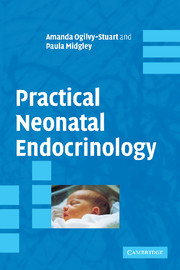Book contents
- Frontmatter
- Contents
- Acknowledgements
- Introduction
- 1 Hyperglycaemia
- 2 Hypoglycaemia
- 3 Management of hyperinsulinism
- 4 Hypoglycaemia in infant of a diabetic mother
- 5 Dysmorphic features
- 6 Micropenis
- 7 Hypopituitarism
- 8 Ambiguous genitalia (male): XY disorders of sex development
- 9 Cryptorchidism
- 10 Ambiguous genitalia (female): XX disorders of sex development
- 11 Pigmented scrotum
- 12 Adrenal failure
- 13 Collapse
- 14 Hypotension
- 15 Hyponatraemia
- 16 Hyperkalaemia
- 17 Hypernatraemia
- 18 Maternal steroid excess
- 19 Hypercalcaemia
- 20 Hypocalcaemia
- 21 Investigation and management of babies of mothers with thyroid disease
- 22 Maternal or familial thyroid disease
- 23 Goitre
- 24 Abnormal neonatal thyroid function tests
- 25 Hypothyroxinaemia in preterm infants
- Appendix 1 Calculation of glucose infusion rate
- Appendix 2 Dynamic tests
- Appendix 3 Normal ranges
- Appendix 4 Biochemistry samples
- Appendix 5 Formulary
- Index
25 - Hypothyroxinaemia in preterm infants
Published online by Cambridge University Press: 15 February 2010
- Frontmatter
- Contents
- Acknowledgements
- Introduction
- 1 Hyperglycaemia
- 2 Hypoglycaemia
- 3 Management of hyperinsulinism
- 4 Hypoglycaemia in infant of a diabetic mother
- 5 Dysmorphic features
- 6 Micropenis
- 7 Hypopituitarism
- 8 Ambiguous genitalia (male): XY disorders of sex development
- 9 Cryptorchidism
- 10 Ambiguous genitalia (female): XX disorders of sex development
- 11 Pigmented scrotum
- 12 Adrenal failure
- 13 Collapse
- 14 Hypotension
- 15 Hyponatraemia
- 16 Hyperkalaemia
- 17 Hypernatraemia
- 18 Maternal steroid excess
- 19 Hypercalcaemia
- 20 Hypocalcaemia
- 21 Investigation and management of babies of mothers with thyroid disease
- 22 Maternal or familial thyroid disease
- 23 Goitre
- 24 Abnormal neonatal thyroid function tests
- 25 Hypothyroxinaemia in preterm infants
- Appendix 1 Calculation of glucose infusion rate
- Appendix 2 Dynamic tests
- Appendix 3 Normal ranges
- Appendix 4 Biochemistry samples
- Appendix 5 Formulary
- Index
Summary
Clinical presentation
Usually incidental finding of hypothyroxinaemia in preterm baby when thyroid function assessed. In the UK, most of Europe and areas of the USA, thyroid-stimulating hormone (TSH) rather than thyroxine (T4) is measured as newborn screen for congenital hypothyroidism and hence hypothyroxinaemia without elevated TSH will not be picked up. Thyroid function may be assessed if there is a clinical suspicion of hypothyroidism, but more usually as part of a screen for prolonged jaundice.
Approach to the problem
Exclude primary hypothyroidism (elevated TSH, see Chapter 24) and central hypothyroidism (normal or low TSH, see Chapter 7).
Differential diagnosis
Hypopituitarism.
Investigations
fT4 and TSH.
Review blood sugar measurements and electrolytes and if necessary exclude hypopituitarism (see Chapter 7).
Management
Immediate
Although there is an association of low T4 levels, and morbidity and mortality in preterm babies, the data to date do not support thyroid hormone supplementation. Although one study has shown a possible benefit of thyroid hormone supplementation on the neurodevelopment of babies born between 25 and 26 weeks gestation, it also demonstrated a possible detrimental effect of thyroid hormone supplementation on neurodevelopment in babies born between 27 and 29 weeks gestation. Until further data are available, thyroid hormone supplementation in preterm babies either to prevent or to treat hypothyroxinaemia cannot be recommended outwith the context of a clinical trial.
- Type
- Chapter
- Information
- Practical Neonatal Endocrinology , pp. 171 - 176Publisher: Cambridge University PressPrint publication year: 2006



